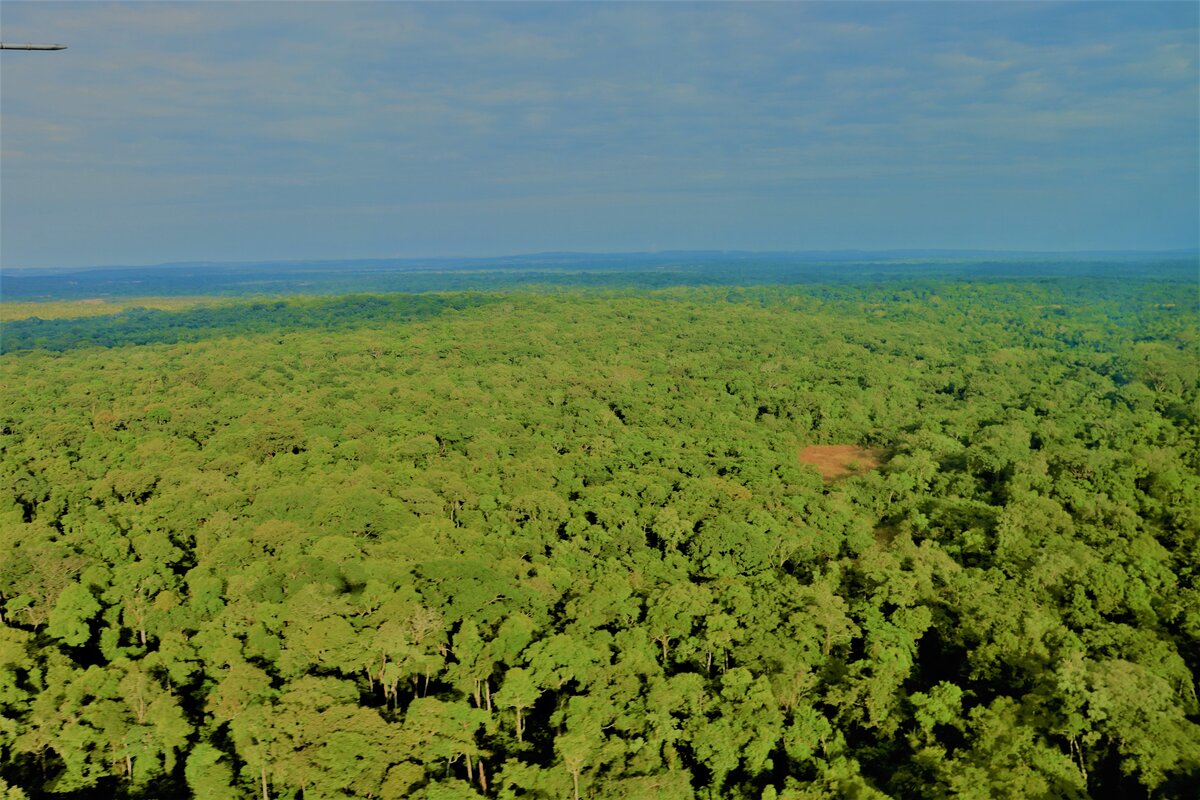AWF and ICCN Join Forces in EU-Funded Project to Revitalize Bili Uéré Landscape

AERIAL VIEW OF THE BILI-UELE LANDSCAPE IN NORTHEAST DRC.
General Inquiries
Tel:+254 711 063 000
Ngong Road, Karen, P.O. Box 310
00502 Nairobi, Kenya
The African Wildlife Foundation (AWF) and the Institut Congolais pour la Conservation de la Nature (ICCN) have partnered on a new project aimed at enhancing the Bili Uere landscape in the Democratic Republic of Congo (DRC). Funded by the European Union (EU), this initiative marks a significant chapter in the NaturAfrica program’s focus on the Congo Basin Forests’ Metallic Landscape.
The project is in line with AWF’s Bili Uéré Landscape Conservation Strategy (2023-2033) and enhances the existing co-management agreement between AWF and ICCN for the Bili Uéré Hunting Estate and Mbomu Wildlife Reserve, established in 2016. It also strengthens the logistical and operational capabilities of ICCN and AWF while promoting inclusive governance of natural resources and empowering local and pastoral communities.
Clive Meakin, Bili-Uere Landscape Director, sheds light on the project’s far-reaching vision: “We aspire to transcend sustainable development and inclusive green growth. We aim to attract conservation-compatible financial investments from the private sector and development partners in crucial areas like agriculture, energy, and infrastructure.”
The recent project’s launch ceremony brought together community leaders, the Bas-Uélé provincial government, and civil society representatives. Highlighting the project’s reciprocal nature, Yves Milan Ngangay, Director General of ICCN, emphasized its role as a fair exchange for the local communities’ unwavering dedication to protecting the landscape, a haven for the endangered Central Chimpanzee.
“Over the next three years, this project will be a testament to our accountability,” Ngangay continued. “We acknowledge that conservation efforts must be coupled with tangible benefits for the local community. We cannot afford to engage in ineffective strategies that lead to no substantial progress.”
Christophe Kondanga Lemonde, the province’s vice-governor, expressed optimism about the NaturAfrica launch. He envisions it building upon the triumphs of the ECOFAC6 program and fostering a lasting, positive partnership that benefits not only the Bili-Uéré landscape but also the entire Bas-Uélé province.
The local community eagerly awaits the project’s implementation, viewing it as a beacon of hope to solidify their commitment to conservation and improve their way of life.
Marcel Gbandali, chief of the Gwamangi chiefdom, welcomed the project, expressing his desire for continued involvement in land-use planning that aligns with AWF’s objectives.
On his part, Roger Dangako, chief of the Bosso chiefdom, voiced his expectations for AWF and ICCN to uphold human rights throughout the project’s execution, building on the existing effective mechanisms for managing complaints and conflicts.
The project seamlessly integrates with local development goals and contributes to national strategies, including the DRC’s National Strategy for Biodiversity Conservation in Protected Areas, the National Strategy and Action Plan for Biodiversity, and the National Program for the Environment, Forests, Water, and Biodiversity.
Antoine Tabu Senga, AWF’s Coordinator in the DRC, emphasized that while the project primarily supports Goal 15 (Life on Earth), it also contributes to other Sustainable Development Goals such as No Poverty, Gender Equality, Decent Work and Economic Growth, Climate Action, and Partnerships for the Goals. This reflects AWF’s comprehensive conservation approach, prioritizing people and integrating economic incentives.
“With these solid foundations, the new project is poised to achieve remarkable conservation outcomes in the Bili Uéré region.”
This ambitious project, backed by a 4.5-million-euro agreement between AWF and the EU, builds on the accomplishments of the ECOFAC6 project. The prior initiative laid a strong foundation for AWF and ICCN in Bili. It significantly enhanced ICCN’s governance and management of protected areas, fostered strong community relationships, and established inclusive governance structures.